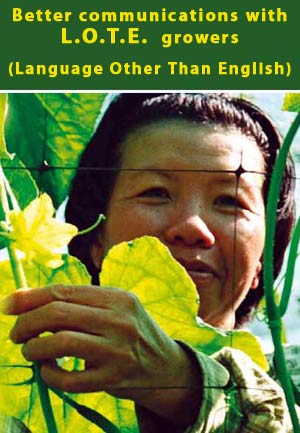|
|
A survey conducted in 2005, identified 40 per cent of Australian growers were from a Language Other Than English (LOTE) background. This project has looked at ways of enabling LOTE growers to access R&D projects and integrate them into the mainstream vegetable industry. This project looked at the underlying issues that were crucial when communicating R&D outcomes to non-English speaking vegetable growers.
Introduction : The Australian vegetable industry is highly diverse in the types of produce grown, geographic areas and grower demographics. In particular LOTE growers have difficulties understanding political decisions of government surrounding seasonal labour, working visas, immigration restrictions and laws. The vegetable industry tends to be state focussed with limited communication between growers within and across the states. Again, this problem is exacerbated with LOTE groups who tend to cluster geographically and stay within their own communities due to language and cultural barriers. Some communication across states does exist within language groups and this been further developed and improved upon during the course of this project. LOTE growers receive communication through a wide variety of channels that vary for each language group and geographic area. In the past, this communication has been ad hoc, mostly delivered in English and with little coordination between organisations or states. In most cases, the best form of communication is through existing trusted networks, including government and commercial agronomists and bilingual officers, chemical resellers and rural suppliers, grower associations and often by word of mouth. Communication levels with these audiences are relatively low and therefore LOTE growers do not benefit to the extent that they should from R&D projects. Project Outcomes :
Acknowledgements : Due to staff changes in AUSVEG, the LOTE steering committee has changed since the project began.
The authors acknowledge the following for their contribuition to this project :
This project has been facilitated by the Rural Industries Research Development Corporation (RIRDC) and Horticulture Australia Limited (HAL) The Australian Government provides matched funding for all HAL’s R&D activities. |
||||||
|

